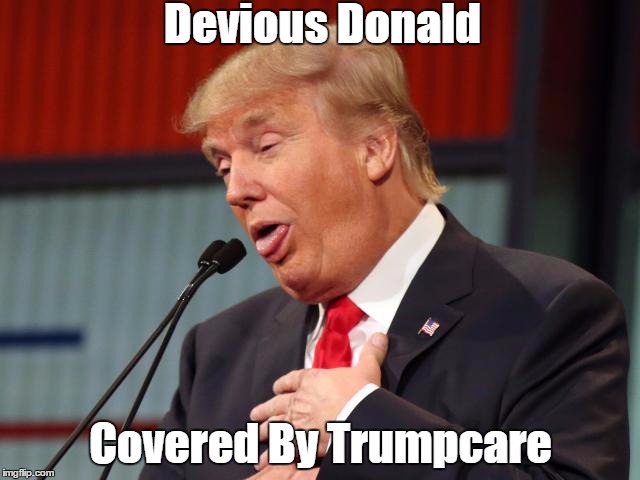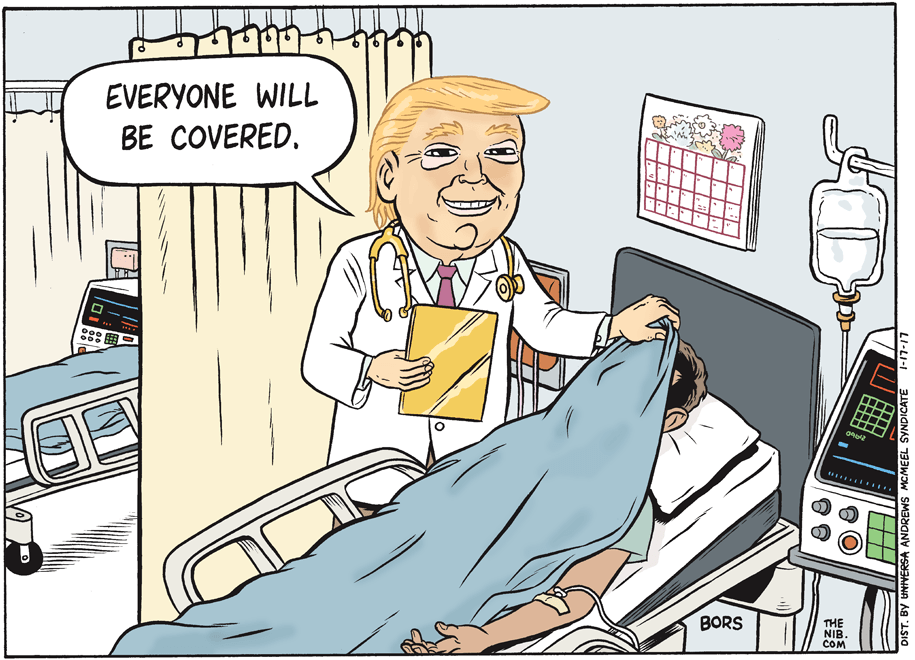
TRUMPCARE VS. OBAMACARE
Americans don’t want to lose the benefits they have gained, and Republicans are hearing about it.
Atul Gawande

But Obamacare, it turns out, has done a lot of good. It guarantees that people with preëxisting health conditions cannot be rejected by insurers or charged more than others. It has reduced the number of uninsured people by twenty million. It has increased access to primary care, specialty care, surgery, medicines, and treatment for chronic conditions. Patients are less likely to skip needed care because of the cost. As a result, according to studies conducted at Harvard, the A.C.A. is saving tens of thousands of lives each year.
Now Republicans in Congress are facing the wrath of constituents who don’t want to lose those gains. Conservatives have had to back off from their plan to repeal Obamacare now and worry about replacement later. Instead, they must grapple with what they have tried to ignore: the complexities of our health-care system, especially in the four vital areas of employer-sponsored coverage, Medicaid, the individual insurance market, and taxes.
Half of Americans get their health coverage through their employer. For them, the A.C.A. brought such popular changes as uncapped coverage, inclusion of children up to the age of twenty-six, and requirements that insurers cover not only primary care but also pediatric dental and vision care, mental-health care, and, with no co-payments, preventive care. The Republicans probably won’t risk eliminating these provisions—except for contraceptive coverage—but they dislike the measures that have kept employers providing health benefits: tax penalties for big companies that don’t; tax credits for small businesses that do.
It was Obamacare’s dramatic expansion of Medicaid, in participating states, to all Americans living near the official poverty line that produced the largest reductions in the uninsured. Many Republicans have vowed to cut back the program’s funding, and to send the money to states as a lump sum, or “block grant.” This approach, however, is apt to throw millions out of coverage and many states into fiscal crisis, and key Republican governors and senators are opposing it.
Republicans are also divided on what to do about the roughly ten per cent of Americans—freelancers, independent contractors, and the like—who aren’t covered by an employer, don’t qualify for Medicare or Medicaid, and must rely on the individual health-insurance market. Before the A.C.A., these people were the most vulnerable in the system; twenty-seven per cent of non-elderly adults have a preëxisting condition that makes them effectively uninsurable without the law’s protections. Now they can sign up through online exchanges for plans that are priced without regard to health history and are subsidized based on income.
Republicans claim that the program is in a death spiral. It isn’t; enrollment has held constant. But there is a need to draw in younger, healthier people to offset the costs of older, sicker people and keep the premiums steady. Doing so depends on promoting HealthCare.gov widely and enforcing the tax penalty for people who don’t sign up. The President, however, has issued a raft of contradictory directives that ultimately instruct the government to do neither. As a result, more and more insurers are saying that they will pull out of the exchanges, risking the collapse of the individual market.
Having promised to get rid of the insurance mandate, Republicans are considering alternatives, but so far they are all inadequate. A requirement for people to maintain “continuous coverage”—to take an example supported by the new Secretary of Health and Human Services, Tom Price, and Speaker of the House Paul Ryan—would mean that people who lose their insurance temporarily, because they, say, change jobs or suffer a financial setback, would also lose their preëxisting-condition protections. For these people and for others left behind, Price and Ryan advocate state-run “high-risk pools.” But, in the thirty-five states that offered high-risk pools to the uninsurable before the A.C.A., inadequate funding delivered terrible coverage, with extremely high premiums and deductibles, and annual limits as low as seventy-five thousand dollars.
Hardly anyone signed up.
For orthodox Republicans, the central issue is, of course, taxes. Obamacare increased them, particularly for high-income individuals and for industries that profit from the expansion of coverage, to pay for the costs of reform. (The A.C.A. actually reduces the deficit.) Many Republicans have made cutting those taxes their top priority; others see preserving coverage as the imperative. Each side thinks the other is committing political suicide. But, with so many Americans beginning to recognize how much they stand to lose, the political equations are shifting.
Governance is forcing Republicans to confront the reality that repeal without replacement is untenable. In a stalemate, Congress would likely need to delay repeal and, to reassure skittish insurers, focus on small-scale repairs, such as affirming that subsidies will continue to be funded, and either enforcing the existing mandate or revising it so that more young and healthy people sign on. (For instance, healthy people could be charged an extra ten per cent on premiums if they forgo insurance for a year, the same as the penalty for elderly people who refuse Medicare Part B.) In addition, the states that sat out the Medicaid expansion in order to thwart President Obama would be free to join in under a Republican Administration, as many would like to. “Insurance for everybody,” Trump has vowed. A Trumpcare compromise could yet bring us a step closer to it.
But legislators have no time to waste. Insurers must decide by April whether to offer a plan for the exchanges in 2018, and at what price. That requires certainty about the future. Pitchforks have their uses, but crafting health-care policy calls for more delicate instruments. The basic functioning of the health-care system is at stake. So are American lives. ♦
No comments:
Post a Comment